
Chin State is notoriously one of the hardest-to-reach regions of Myanmar with high mountains and is not on any of the regional transportation corridors. It is land locked and has lagged behind Myanmar’s overall economic development. In Chin State, one person out of two is a migrant—the remaining households have been uniquely been affected by outward migration.
As over half of people from Chin State live outside of the State’s boundaries, scholarship on the region must focus beyond state boundaries and look at those living elsewhere in Myanmar, in neighboring countries, and beyond. Chin State also has a strong, exposed and educated diaspora whose remittances play a significant role in an otherwise low-earning internal migrant population. The recent and increasing arrival of large international aid and development programs in the region has further been contributing to a variety of social, cultural, and developmental changes.
Chin State is also experiencing social and agricultural transformations much like elsewhere in Myanmar, which are changing livelihood strategies and traditional indigenous relationships to land and culture. Further, a slow but much-anticipated economic development will also inevitably have impact on the environment and quickly generate multiple transformations of the region whose impact goes beyond creating employment and better income, some of which members of this panel will be exploring.
Some of the other questions this panel will be asking include: What are the main issues affecting the lives and well-being of people from Chin State? How have these issues changed over the last few decades? What impact have the changes happening in Myanmar in the last few years brought to the region, its people, and its places, both in terms of agriculture, development, and social-cultural changes? What is the relationship between Indigenous Rights claimed by ethnic minority populations and Development? How do we look at geography, development, migration, gender, and history to better understand the challenges communities from Chin State face? Who lives in Chin State? Who lives around it and outside it? What happened to those who already left Chin State?
Abstracts submitted should address the overall themes of transformations adopted by the overall ICBMS Conference, and fall in any of the following areas:
1. Development & Transitions in Myanmar
2. Agro-based Economy
3. Bio-diversity/Environment and Climate Change
4. Rural Transformation/Rural Development/Poverty Alleviation
5. Cultural Heritage and Tourism
6. Media, Popular Culture and Communication
7. Governance, Social Security and Peace Process
8. Health Care
9. Population Change, Migration & Displacement
10. Urbanization/Rural-urban Relations
11. Food Security and Food Practice
12. Education and Development
13. Literature, Language and Society
14. History and Social Memory
15. Ethnicity and Gender Relations
16. Religion and Belief Systems
17. Resource Management
——————-
This panel represents an opportunity for students, early career and established researchers from diverse backgrounds working within this field to meet and exchange ideas, as well as offering potential for future collaboration. The panel is interdisciplinary, and submissions are invited from a variety of academic and non-academic backgrounds from interested students, academics, researchers, as well as practitioners and activists.
Application process: If interested in participating in this panel, please email the Panel Convener Ms. Sena Galazzi (SOAS) and also copy to Mr. Sang Hnin Lian (Mahidol) ASAP and before November 6th 2017 at the following email addresses (please email both people): sena_galazzi@soas.ac.uk and sanghnin.lia@student.mahidol.ac.th
In your email please include the following:
1. proposed paper title
2. abstract (no more than 300 words)
3. short bio (no more than 150 words)
Outcomes: If your abstract is accepted onto this panel, and if this Panel Submission is successful in its application to the ICBMS Conference, authors will then be invited to write a paper on the subject of their abstract, and prepare a 10-minute oral presentation on their topic. The presentation needs to be delivered at the conference in Mandalay.
The paper and the oral presentation need to be in either English or Burmese. The papers submitted to this panel will be due Friday 5th January to the Panel Convener, by email. Papers in English should be 3,000 – 4,000 words. For papers in Burmese, we expect around 10 pages with Win Innwa font, sized 16, 1.5 spacing.
Support available: If our panel submission to the ICBMS Conference is successful, peer to peer support will be available for papers that are written in English. This will include editing help and support on framework, structure, and argument development for preparation of the whole paper.
We are happy to answer informal questions you might have, don’t hesitate to get in touch if you are interested. We look forward to hearing from you.

